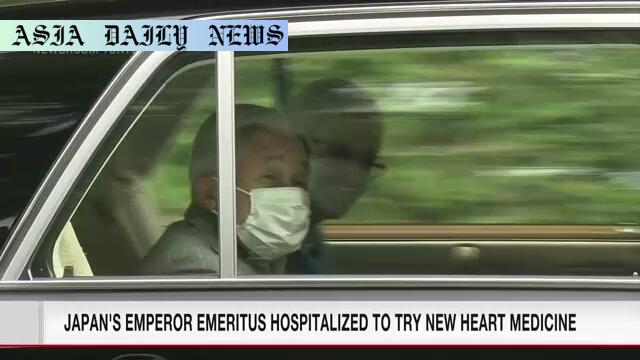Emperor Emeritus Akihito hospitalized for heart medication adjustment
Japan’s Emperor Emeritus Akihito hospitalized for heart medication adjustments.
Doctors are optimizing treatment to ease strain on his heart due to aging.
Past diagnosis includes coronary bypass and right heart failure, emphasizing concern for aging health.

Introduction
Emperor Emeritus Akihito of Japan has been hospitalized at the University of Tokyo Hospital for adjustments to his heart medication. At the age of 91, the former emperor continues to face challenges related to heart health. This recent hospitalization highlights efforts by medical professionals to improve his condition amid advancing age-related complications. The Imperial Household Agency has maintained transparency regarding these developments, shedding light on the complexities of treating a condition as significant as heart disease in the elderly.
The Journey to Medical Attention
Emperor Akihito has a history of heart-related medical issues, beginning with a coronary bypass operation in 2012. Diagnosed with angina at the time, his condition was addressed surgically. However, as the years progressed, further complications arose. In 2022, the former emperor was diagnosed with right heart failure, adding to concerns about his cardiovascular well-being. Recent examinations revealed asymptomatic myocardial ischemia, a condition where insufficient coronary blood flow occurs, particularly during physical exertion.
Adapting Treatment for Aging Health
The medical evaluation in May 2023 marked a turning point in his treatment plan. Although he had not experienced chest pain or other symptoms, doctors noted hardening of the arteries due to aging. In response, he was prescribed medication to improve circulation and relieve strain on his heart. However, this approach required fine-tuning as his condition did not show marked improvement. The decision to adjust the dosage reflects the complexity of managing heart disease in elderly patients, particularly when coupled with potential side effects like irregular heartbeat.
Hospitalization and Monitoring
The decision to admit Emperor Akihito to the University of Tokyo Hospital underscores the careful precautions being taken by his medical team. During his stay, doctors will meticulously monitor his electrocardiographic data and observe for any adverse drug reactions. Such a proactive approach aims to respond swiftly should any complications arise. Hospitalization for medication adjustments is not uncommon in cases involving elderly or high-risk patients, but it often accompanies heightened concern from both doctors and the public.
A Commitment to Health and Public Service
Even during his years as the Emperor Emeritus, Akihito has remained an important figure in Japan. Alongside the Empress Emerita, Michiko, he has continued contributing to cultural and societal engagements. His health is not just a personal concern but one that resonates deeply with the public due to his revered position and lifelong dedication to Japan. The steps being taken by medical professionals to ensure his well-being reflect the broader impact of his life and work on the country.
Conclusion
As Emperor Emeritus Akihito undergoes treatment to manage his heart condition, it is a reminder of the challenges associated with aging and cardiovascular health. His journey through surgeries, diagnoses, and ongoing treatment embodies the resilience required to tackle such conditions. The support from the medical community and the Imperial Household Agency signifies their unwavering dedication to his care. This latest development underscores the importance of health in ensuring a fulfilling and sustained role in public life, even during retirement.



Commentary
Aging and the Struggles of Health
Emperor Emeritus Akihito’s health challenges bring to light the realities of aging, particularly as they relate to cardiovascular issues. The advancements in medical technology and practices allow for conditions such as myocardial ischemia to be managed effectively. Yet, the complexities involved cannot be understated, especially in the case of someone who has dedicated his life to public service. Balancing the demands of health while sustaining a revered position in society is no small feat, and Akihito’s continued determination is admirable.
The Role of Medicine: Precision in Treatment
The use of targeted treatments like medication adjustments is a testament to the precision and personalized care modern medicine provides. With aging populations worldwide, Emperor Akihito’s case serves as an example of how careful monitoring and treatment are crucial in preserving quality of life. His case underscores the importance of being vigilant about aging health and seeking timely intervention when necessary. It demonstrates the complexity of treating diseases that interact with the natural aging process.
Public Figure, Personal Health
For a figure as esteemed as Emperor Emeritus Akihito, his personal health also becomes a public concern. The legacy of his reign and his ongoing contributions as the Emperor Emeritus make his well-being a matter of national significance. His hospitalization evokes a mix of emotions among his admirers—concern, empathy, and hope. It’s a poignant reminder that even those in positions of power and influence are ultimately human and susceptible to the frailties of life.
A Message of Resilience
Through his careful adherence to medical advice and trust in his physicians, Emperor Akihito conveys a message of resilience and hope. The transparency maintained by the Imperial Household Agency ensures that his journey is one not of despair but of enduring strength. His treatment journey might inspire others to prioritize their health and take preventive measures, whether through regular medical checkups or listening to their bodies. Emperor Akihito continues to embody grace and strength in his personal and public life.